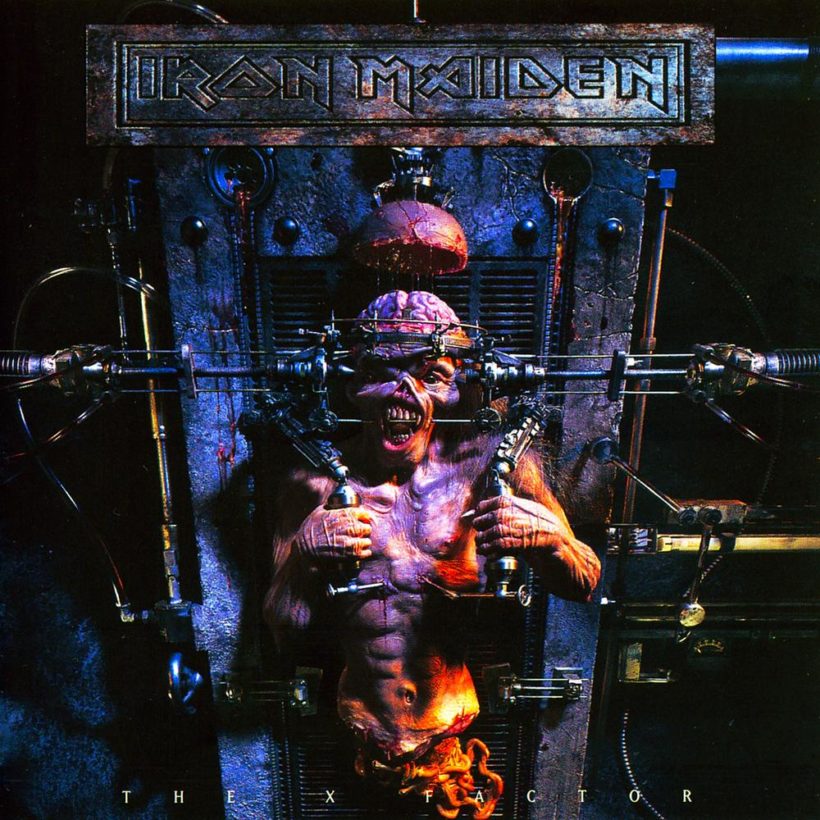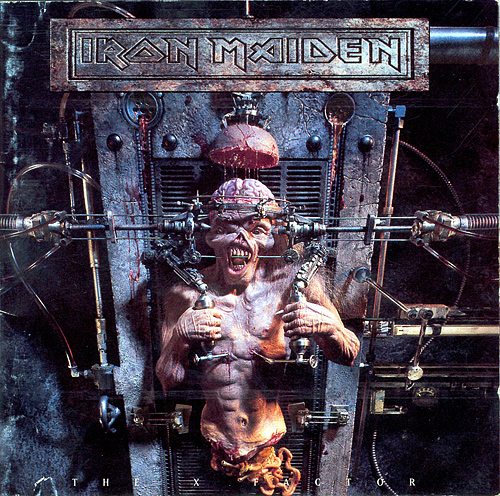
Almost every band has that album: you know, the critically and/or commercially reviled dud in an otherwise passable-to-radical back catalog. Well, every Wednesday morning, a Decibel staffer or special guest will take to the Deciblog to bitch and moan at length as to why everybody’s full of shit and said dud is, in fact, The Shit. Today, Adrien Begrand defends Y U gotta B all OMG for Iron Maiden’s The X Factor.
These days it’s easy to sit back, reflect on the debacle that was Iron Maiden in the mid-’90s and wonder, What the heck were they thinking? Replacing Bruce Dickinson? Were they mad? But go back to 1992 (if you’re old enough to remember, that is!), and you could see the split coming from a mile away. After a spectacular run of seven studio albums that ranged from excellent to classic—not to mention the greatest double live album ever, and world tours that got bigger and bigger with each passing year—the bottom had to fall out eventually. That crazy rollercoaster ride had to start another slow, upward climb sooner or later.
In 1990, the disastrous No Prayer for the Dying sounded just plain exhausted, the band totally lacking inspiration, either lazily recycling old ideas (token war-themed tune “Tailgunner,” token historial epic “Mother Russia”), following trends (dudes, lampooning evangelists was so 1987), and even covering a terrible song Dickinson recorded for a movie soundtrack. 1992’s Fear of the Dark was the slightest of improvements, a rare moment of inspiration (“Be Quick or Be Dead”) overshadowed by awful songwriting and the tritest, most audience-pandering song of Steve Harris’ career (the inexplicably popular title track). By then you could see Dickinson had clearly lost interest in all things Maiden. He’d written a novel. His loose, relaxed 1990 solo debut Tattooed Millionaire showed he was having more fun doing his own thing. Watch any of Maiden’s live footage from ’92-’93 (just look at the awful Raising Hell video for proof), and you’ll see a dude whose mind was obviously elsewhere.
Dickinson’s departure in 1993 was no surprise, and for many of us who were so disillusioned by those two lousy albums, it was hard to care at all anymore. And when you look at the four solo albums Dickinson put out between 1994 and 1998, it was the best thing that could possibly happen to him. Typical of the rest of Iron Maiden, they stubbornly decided to forge ahead, but while Dickinson experienced a creative rebirth with such records as Balls to Picasso and The Chemical Wedding, it would be a much rougher go for his old band, as their popularity would plummet, reducing them to playing clubs and small theaters in North America. Not that they didn’t put in a valiant effort, however. Recruiting singer Blaze Bayley from English band Wolfsbane (whose Rick Rubin-produced 1989 album, Live Fast, Die Fast, is a hidden gem), Maiden set about that daunting task of reviving their career; and while that didn’t exactly happen, contrary to popular belief, the music from that era—especially 1995’s The X-Factor—is nowhere near as awful as people say it is. In fact, at times it’s pretty damn great.

The X-Factor suffers from the same bloat that plagued countless other rock and metal records in the 1990s, as bands exploited the 79-minute running time of the compact disc; but even with a few filler tracks, it’s still a much stronger effort than either No Prayer for the Dying or Fear of the Dark. With Bayley possessing a more baritone voice, Harris’ songwriting took on a much darker tone to complement it, and that adjustment he makes yields an opening half hour that’s shockingly good. The Falling Down-inspired “Man on the Edge” is an explosive, raw little rocker in the same vein as “Be Quick or Be Dead,” “Lord of the Flies” is not only an effective retelling of the William Golding story, but an effectively hooky tune, and “Fortunes of War” is a workmanlike exercise within that classic Maiden template, shifting from a forlorn ballad to a lively, Harris-driven gallop.
It’s “Sign of the Cross” that’s the real keeper, though. Placed on the album as the opening track, it’s an awfully clunky way to start off a record, but over the years the 11-minute-plus song has aged extremely well, ranking as one of Harris’ finest compositions. The subject matter is rather murky (is it about the Spanish Inquisition, Umberto Eco’s The Name of the Rose, or what?), but whatever the hell it’s about, it’s a highly theatrical piece that boasts a powerful vocal performance by Bayley, not to mention some of the band’s most restrained work on record. The intimacy of Nigel Green’s production plays a big part, as the intimacy of the mix seems to force the band to deliberately avoid slipping into pure bombast. Instead, the guitar work by Dave Murray and Janick Gers is more textured, the big crescendos a lot more controlled, Michael Kenney’s keyboards softening the tone just enough. Long, but far from long-winded, it’s an invigorating, at times gorgeous song.
Elsewhere, songs like “The Aftermath,” the surprisingly moving “Judgment of Heaven” and the morose ballad “Blood on the World’s Hands” help anchor the album’s second half before coming to a rousing climax on “Edge of Darkness,” in which Harris and Bayley retell Heart of Darkness to great effect. Sure, we could do without “Look for the Truth,” “2 A.M.” and “The Unbeliever,” and that Hugh Syme artwork is just plain off-putting (a real-life Eddie is just as disturbing as a real-life Homer Simpson), but there’s still a lot to like on The X-Factor.
In the end, of course, having Bruce return to Iron Maiden in 1999 was the smart thing to do. Despite a good showing on record, Bayley simply lacked the vocal range to make Dickinson’s classic material work. And in a smart move, Dickinson went on to perform several tracks from The X-Factor on subsequent tours: he did a great job on “Man on the Edge” and “Lord of the Flies,” and his Rock in Rio performance of “Sign of the Cross” instantly brought the song to the attention of Bayley-era skeptics, forcing some, including yours truly, to re-evaluate their opinion. Lie any other Maiden fan, I’m more interested in listening to the band’s superb, post-reunion body of work (Brave New World, Dance of Death, A Matter of Life and Death and last year’s brilliant The Final Frontier), but to this day, every so often I dust off those much-maligned Blaze tracks, and the more time passes, the more I realize just how big a mistake it was to completely dismiss Iron Maiden when they were going through their identity crisis 15 years ago. The sales weren’t there, nor the chemistry at times, but the passion sure was.
I’ve long said that if you made a 45 or 50 minute album out of Iron Maiden’s best Blaze Bayley-era songs, you’d get a record that holds up alongside the best of their work, and definitely something exponentially better than No Prayer or Fear of the Dark. If you’ve got Spotify, have some cash to spend on iTunes, or are one of those file-stealing kids on bittorrent, I suggest you try putting this fine little mix together. You might be pleasantly surprised:
1. “Man on the Edge”
2. “Lord of the Flies”
3. “The Clansman”
4. “The Angel and the Gambler
5. “Futureal”
6. “The Edge of Darkness”
7. “Sign of the Cross”
(actual The X-Factor tracklist)
1. “Sign of the Cross”
2. “Lord of the Flies”
3. “Man on the Edge”
4. “Fortunes of War”
5. “Look for the Truth”
6. “The Aftermath”
7. “Judgement of Heaven”
8. “Blood on the World’s Hands”
9. “The Edge of Darkness”
10. “2 A.M.”
11. “The Unbeliever”






